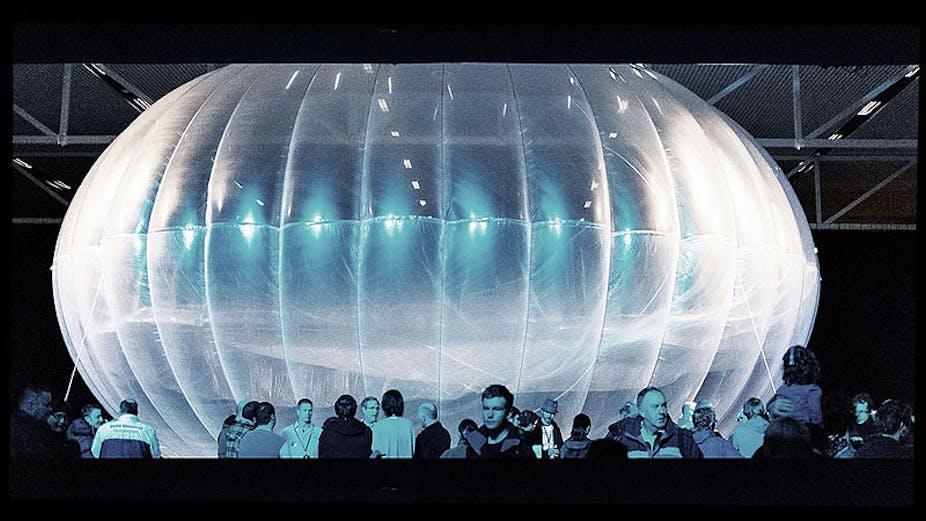A flurry of initiatives aimed at connecting the billions – mainly in Africa – who still do not have access to the internet are underway. A few weeks ago, Google’s possibly aptly named Project Loon was launched. The internet giant announced it plans to raise a stratospheric flotilla of balloons that would bounce an internet connection to the remotest people, communities and countries. This week, Facebook joined in on the act by announcing a partnership with an array of technology companies with the aim of lowering the cost of mobile data to help people in developing countries connect.
These initiatives, and indeed many other similar enterprises, turn on the fact that only a third of the world’s population enjoys reliable access to the internet. This is seen as a Very Bad Thing, which it may well be. While it would be wrong to automatically dismiss any attempt to spread technology more equitably around the world, we should consider what this might actually mean for the people involved, not forgetting that the motives of Google, Facebook and co are clearly not completely altruistic.
Truly transformative?
Will access to the internet transform lives and livelihoods? While services such as mobile banking system M-Pesa have allowed cash transfers to flow more smoothly and cheaply in developing countries, and initiatives such as UK charity Practical Action’s Practical Answers has shared huge amounts of technical knowledge around access to energy, fresh water and sanitation, the impact of the internet where it does reach has been relatively limited.
The work of Claire Mercer, for example, has shown that the great hope pinned on enhanced internet access in rural Tanzania to reshape the population as knowledge-seeking, market-interacting, productive citizens has largely been misplaced. In reality, rural Africans more or less use the internet for the same purposes as everyone else: keeping in touch with people, keeping up to date, and entertaining themselves.
Apart from the odd exception, epitomised by the founders of Silicon Valley success stories, the internet tends not to virtually ignite some hitherto hidden entrepreneurial spark in all of us. Usually, it just allows us to use Google and Facebook.
Sweating the small stuff
There is also a long history of massive technocratic projects failing to deliver development. Bill Gates has been an especially vocal critic of Project Loon, arguing that internet access is no good if people have no access to basic medicine or functional health systems: the medical divide trumps the digital divide.
While the internet has a role in health, for example by virtually connecting primary healthcare centres, research centres and schools, Gates has questioned the long-term commitment of Google’s involvement in developing country projects. The success of massive projects is rooted in the sustainability of the smallest component – and that requires commitment and a large chequebook. Laptops need power, data needs bandwidth, users need relevant information in their local language. The global power of the internet can fade into the ether as a result of the tiniest failing of local infrastructure.
In it for the long haul
We might roll our eyes at Facebook’s attempts to set itself up as the saviour of the developing world but long-term commitment to these initiatives might just be more important than its motivations for starting them in the first place.
Google and Facebook clearly have a vested interest in more users, denser networks and more data to mine. It is also true that quite a lot of recent news stories about these companies have not been positive in terms of how and why data is mined, stored and shared. Bill Gates has questioned Google’s motives, and the moral authority of the work of the Bill and Melinda Gates Foundation gives him some right to do so. However, his model of massive philanthrocapitalism bridging divides is not the only approach in town.
If companies are making tentative steps to build infrastructure and access in developing countries because they smell a potential profit, is that such a bad thing? The rapid adoption, sustainability and ultimately local innovation surrounding mobile phones in Africa was built around initial state and donor investment and subsequent private profit from providing an affordable service that meets a need.
Meaningful transformation depends on results in many areas: infrastructure, institutions, markets, knowledge, values. We need to build relationships between the state, the private sector and civil society. It is not balloons in the stratosphere that bring real change but a recognition that if we want the internet to work for the poorest members of society, we have to commit to hard work on the ground.

